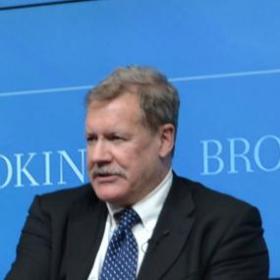
United States Top Brass Wants Contact with Iran
On two occasions in the last month, the Chairman of the Joint Chiefs of Staff of the United States, Admiral Mike Mullen, said in public that he was concerned about lack of contact between his country and Iran. On 20 September, he noted that “Even in the darkest days of the Cold War, we had links to the Soviet Union.” He went on to say: “We are not talking to Iran. So we don’t understand each other. If something happens, it’s virtually assured that we won’t get it right, that there will be miscalculations.”
According to the host organization’s report of the meeting at the Carnegie Endowment for International Peace, Mullen went on to suggest that it would be in the American national interest to resume contact with Tehran at either a political, diplomatic, or military-to-military level.
On 14 September, as reported by the Pentagon, Mullen said that Iran is attempting to develop nuclear weapons and wants regional hegemony in the Middle East; and the lack of contact between the United States and Iran could be dangerous to the region and the international community.
One could see these views more or less as a statement of the obvious – the United States needs to be talking to countries that give it concern. However, given the negative political sentiment in the United States toward Iran and given the rigid policy position of the U.S. government, then Mullen’s statements seem to indicate a division of some sort in the Obama Administration about the wisdom of continuing to isolate Iran diplomatically. Another possible meaning of the remarks, though less likely, is that Mullen is just expressing U.S. frustration that as far it is concerned, Iran has not conducted itself properly to allow re-establishment of contact; and that it is Iran’s behavior that leads to the lack of contact.
Assuming the former interpretation (and not the latter) is correct, Mullen’s views open up the obvious question of what is it that the United States has to do or can do to start meaningful bilateral conversations on both nuclear issues and regional security issues.
Any restoration of formal relations seems highly unlikely in the next 2-3 years. The United States has, at least in a practical sense, made that conditional on a number of significant policy reversals by Tehran. In U.S. policy, Iran is more or less where it was when George Bush gave his “axis of evil” speech in 2002. That said, the route of informal diplomatic “contacts” would be relatively easy if Iran and the United States were both willing.
Yet Mullen’s mention of military and political contacts in contrast to diplomatic efforts suggests a complete roadblock on one side or both to unofficial diplomatic contact. Military contacts would seem even more difficult. It is almost impossible to imagine that the State Department would agree to the idea that military officers would conduct any part of the diplomacy with Iran while diplomatic relations are so strained.
Moreover, at least as far as the public record is concerned, there does not seem to be much of a foundation for military to military contacts. So what about “political contacts”? In the run up to a Presidential election in the United States in 2012, this would seem at first glance to be extremely high risk.
Then there is the problem of who in Iran to talk to. The level of the contact would need to be finely set, and at a fairly middle level, to minimize political risk. Any prediction of what might come from Mullen’s statements would be foolhardy. Yet the ground-breaking significance of his comments as a very direct and unusually public opening to talk with Iranian leaders cannot be discounted.

